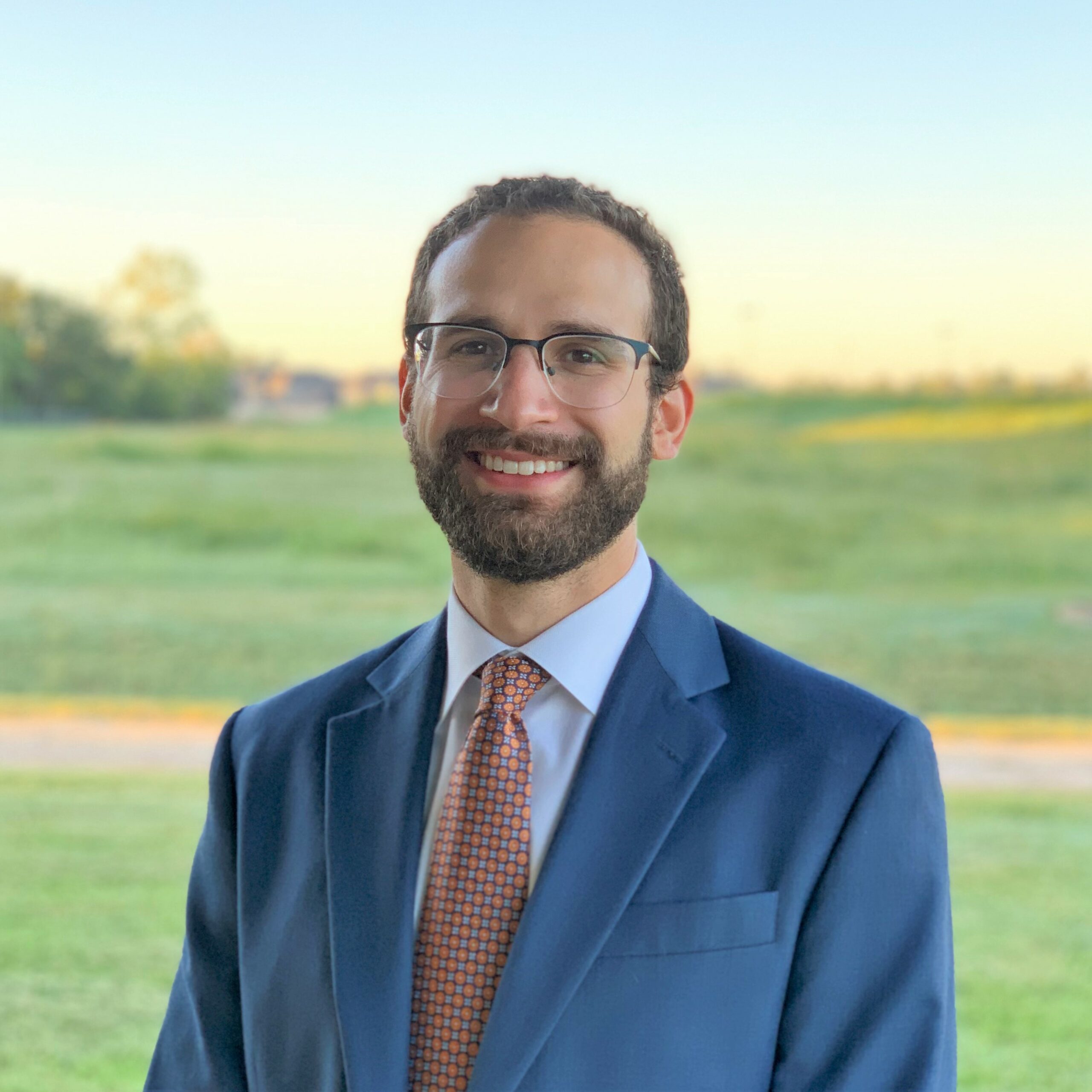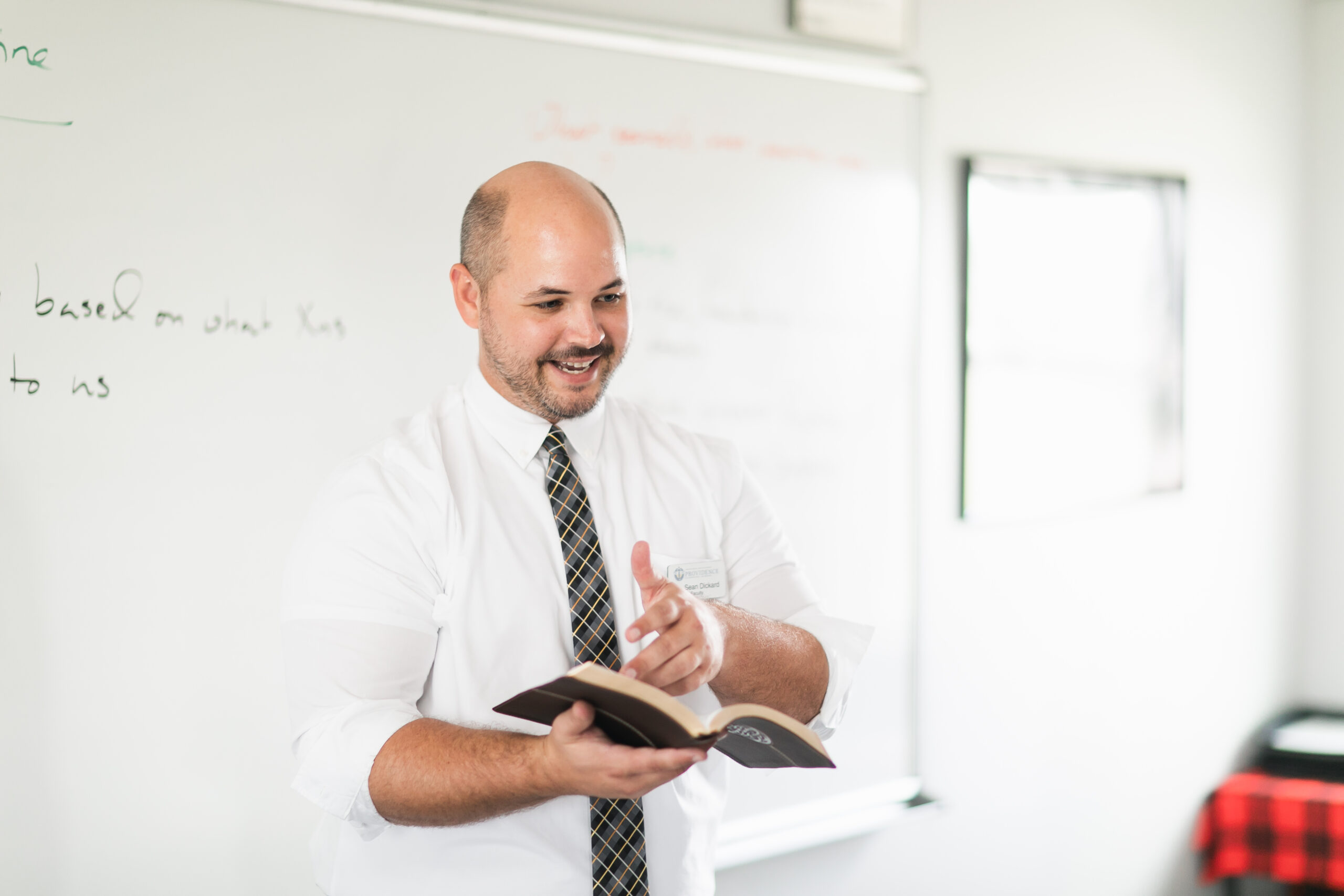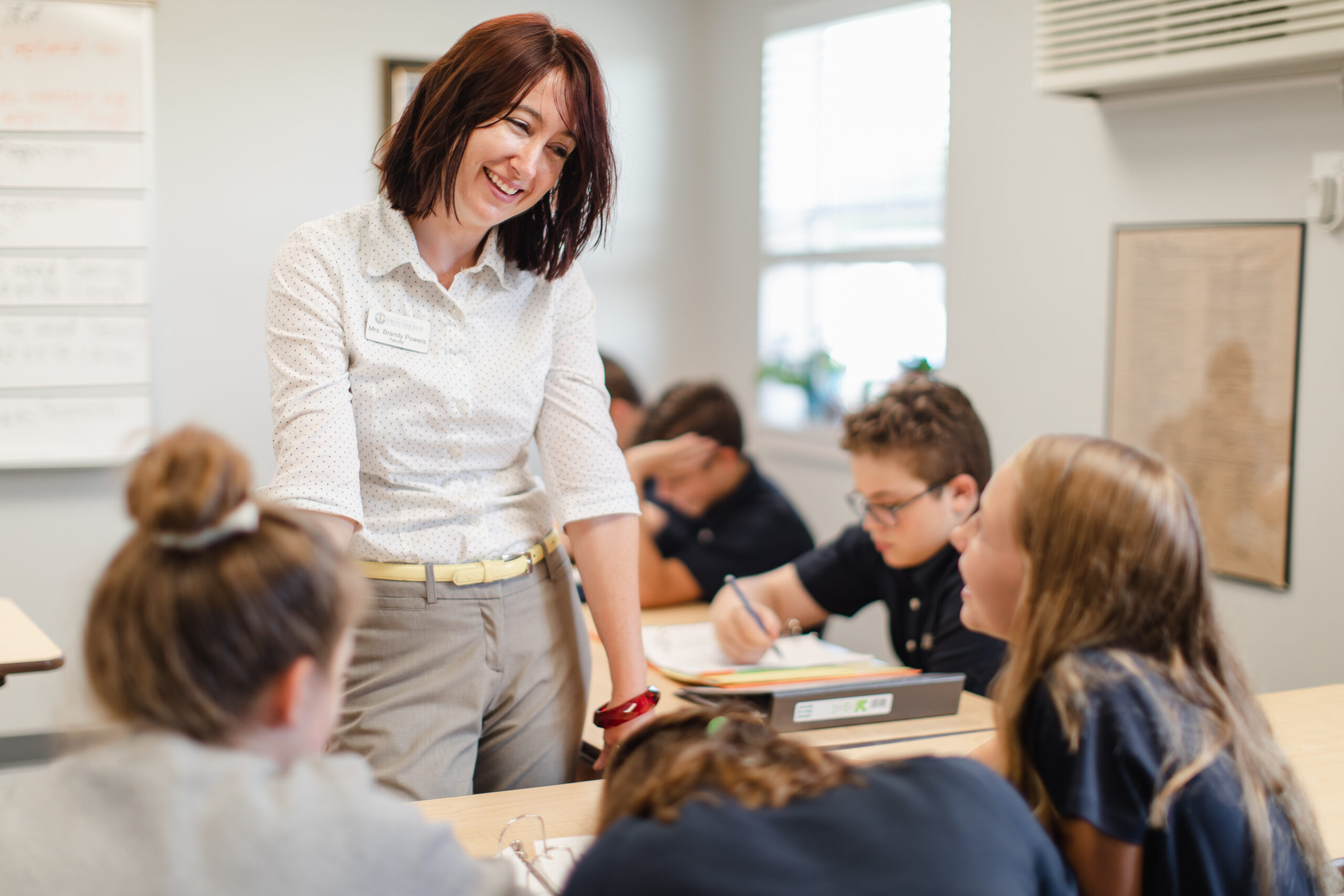The Ministry of Discipleship:
Forming Disciples as a Teacher at Providence
by Michael Dearman

Michael Dearman teaches Rhetoric II, Humanities, and Mock Trial to high school students at Providence Classical School.
Want to learn more about how Providence Classical School partners with parents to disciple the hearts and develop the minds of students?
Praise the LORD, all nations!
Extol Him, all peoples!
For great is His steadfast love toward us,
and the faithfulness of the LORD endures forever.
Praise the LORD!
Psalm 117:1-2
Recently, I’ve been reflecting on the ways in which the Lord has provided for Providence Classical School and for me as a teacher over the past year. God gifted me with the work of ministry. God’s faithfulness extends beyond what He has done for us into what He continues to do, including how the Holy Spirit moves people into our path to minister. The work of teachers at Providence is inseparable from the work of ministry.
The work of ministry
Most Christians know the Apostle Paul’s words in Ephesians 2: “For by grace you have been saved through faith. And this is not your own doing; it is the gift of God, not a result of works, so that no one may boast” (2:8-9). That is normally where people like to end, but Paul concludes the passage by saying, “For we are His workmanship, created in Christ Jesus for good works, which God prepared beforehand, that we should walk in them” (2:10).
Those “good works” are probably countless — some are mundane and some are miraculous. Every act by which we live out those good works is a participation in the life of Jesus Christ and of His goodness. Every act of ministry is an extension of the beachhead of the Kingdom of God and an extension of the ministry of Christ.
The definition of ministry
I always tell my Rhetoric II students to “define their terms,” so what do I mean by “ministry”? Simply this: to so present Christ in word and deed that, through the power of the Holy Spirit, others are conformed to the image of the Son. That is what God graciously provides to teachers here at Providence.
A little over a year ago, I left a large, corporate bankruptcy and restructuring practice in order to pursue a call to ordination in the Anglican Church. In that process, I found my way into classical Christian education to facilitate that call. I was surprised — humbled, really — to find that the Holy Spirit had prepared gospel ministry here, in the classroom, in the hearts and minds of my students, in advance. The “good works” were here for me.
To give an example, the seniors would stumble into school as close to the bell as possible, frazzled (as high school seniors are wont to do), and my first question would often be, “how many of you spent more than five minutes in prayer this morning?” Mostly, the answer was — no one. So instead of charting our course through all the content I had obsessively crammed into my head the night before, we prayed.
We usually prayed some version of morning prayer from the Book of Common Prayer, which essentially involves listening to and praying the Scriptures back to God. The Word of God given to us becomes our words back to God, and through these bits of class time devoted to prayer, the seniors were learning the priority of prayer in their lives and its centrality to fruitful study. Through the discipline, their hearts were shaped to love and to will what Christ loved and willed, which is to commune with the Father.

The fruit of faithfulness
There are so many stories of the ways God showed up with these opportunities. We had a senior come to faith in Jesus Christ because he had teachers in his life who contended for the faith and who provided grace and understanding when he needed it most — and most of us didn’t even know that was what we were doing!
God graciously allows me to be the presence of Christ in students’ lives — to love and encourage them, to pray with them, and to care for them in my capacity as their teacher and, more importantly, their brother in Christ. I didn’t set out to do this; the Holy Spirit provided the ministry. All that is asked of us in these situations is often simple, mundane faithfulness.
What has Jesus called Christians to do? To present him in our own flesh, and that he would be on our lips, and that we would live out the law of love. As teachers, we get to inhabit that beautiful calling in the unique context of this school.
The formation of disciples
In preparing for the new year, I revisited the list of qualities described in our Portrait of a PCS graduate. Providence Classical School graduates will be known for their Character, Knowledge, Discernment, and Communication. Within each of these categories, there are many qualities, so I’ll name just a few.
The PCS graduate:
(1) seeks to bear nobly the image of Christ.
(2) serves God and community.
(3) pursues the kingdom of God.
(4) lives out his or her faith in practice.
(5) presents the truth of the gospel graciously.
(6) understands that the gospel is the answer to all of life.
The list goes on…
Make no mistake, the end goal of our work at Providence is discipleship. Our ministry here at PCS in the midst of all of the teaching and intellectual formation is discipleship.
Those who know me as a teacher know that I demand intellectual excellence from my students because I believe they are capable of it. More than creating great, lifelong, diligent, and gifted learners, we are forming Christians as Christians.

The calling of our community
The provision of ministry is a tremendous gift — one to which I’ve dedicated my life in all respects. I was ordained a deacon last November, and God willing, I’ll be ordained to the priesthood in October. Much of my formative, on-the-ground training in ministry in the past year will have been to our students, in the classroom, in the trenches of life, attempting to present Christ as best I can so that they will come to know and to love Him more and more deeply.
This is not my task alone but the common mission of parents, teachers, and administrators working together.
As God calls teachers to mundane, daily faithfulness in witnessing to the Gospel, He is ever gracious to return to us a thousand-fold for the ministry we undertake.
The image of Christ
Last year, a fellow Providence teacher had seniors memorize the poem, “As Kingfishers Catch Fire,” by Gerard Manley Hopkins. We reflected on it multiple times throughout the year. Hopkins’ words reflect the beauty of the encounter with Christ in others. He writes, that “Christ plays in ten thousand places / . . . through the features of men’s faces.”
Indeed, He does! Christ is in the faces of our students, and He is in the work of teachers’ hands, their words, their smiles, and their listening ears. At Providence, everyone should expect that teachers will present Christ to their students, and teachers can expect that, in God’s graciousness, we will encounter Christ in the faces of our students.
O God, the King eternal, whose light divides the day from the night and turns the shadow of death into the morning: Drive far from us all wrong desires, incline our hearts to keep your law, and guide our feet into the way of peace; that, having done your will with cheerfulness during the day, we may, when night comes, rejoice to give you thanks; through Jesus Christ our Lord. Amen.
Michael Dearman earned his B.A. in political science with honors and his B.A. in philosophy from Southern Methodist University. He went on to earn his Masters of Theological Studies from Duke Divinity School and his Doctor of Jurisprudence from the University of Houston Law Center, where he worked as a teaching and research assistant. After law school, he practiced corporate bankruptcy law as an associate at a large firm in Houston.
Michael joined the PCS faculty in 2020 teaching Rhetoric II, Humanities, and Mock Trial to high school students. He is currently in the process of ordination to the presbyterate in the Anglican Church in North America. Michael’s wife, Katie, is a dance teacher and professional dancer, and together they have two preschool-aged sons.








